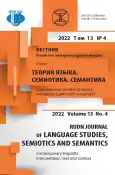Слова с ценностной семантикой в языковом сознании представителей поколения Y
- Авторы: Бутакова Л.О.1
-
Учреждения:
- Омский государственный университет им. Ф.М. Достоевского
- Выпуск: Том 13, № 4 (2022): СОВРЕМЕННАЯ ЛИНГВИСТИЧЕСКАЯ ИНТЕРПРЕТАЦИЯ: ТЕКСТ И КОНТЕКСТ
- Страницы: 937-955
- Раздел: КОГНИТИВНЫЕ ИССЛЕДОВАНИЯ
- URL: https://bakhtiniada.ru/2313-2299/article/view/323466
- DOI: https://doi.org/10.22363/2313-2299-2022-13-4-937-955
- ID: 323466
Цитировать
Полный текст
Аннотация
Исследованы ассоциативный состав и смысловые области, стоящие за знаками, передающими ценности в языковом сознании носителей русского языка, принадлежащих к поколению Y (30-40-летних). Выявлены типы речевого действия в ситуации свободного и направленного ассоциативного эксперимента при реагировании на стимулы ценности, семья, работа, работа какая и т.п. Установлено отсутствие сложности когнитивной структуры ассоциативных полей, превалирование смысловых областей, представляющих социально и личностно значимые нематериальные объекты, - семья, любовь, мораль, этика, человек, которые следует хранить, развивать, передавать. Установлен однозначный характер реагирования, четкие границы области стереотипа, низкий уровень проявления эмоции и оценки, частотность реакций-комплексов (рядов перечислений, например, ценности → безопасность, комфорт, стабильность, семья, свое дело, страна) в большинстве случаев направленного ассоциирования. Концентрация стереотипных смыслов (область частотных реакций ядра ассоциативных полей) выше при реагировании на стимулы Работа какая…, Работа требует чего…, Семья какая … Остальные стимулы вызывают примерное равенство стереотипных и индивидуальных способов реагирования. При выборе реакций значима опора на жизненный опыт респондентов.
Об авторах
Лариса Олеговна Бутакова
Омский государственный университет им. Ф.М. Достоевского
Автор, ответственный за переписку.
Email: larisabut@rambler.ru
ORCID iD: 0000-0003-3210-2311
доктор филологических наук, профессор, профессор кафедры русского языка, литературы и документных коммуникаций
644077, Российская Федерация, г. Омск, пр. Мира, д. 55АСписок литературы
- Basic values of the bearers of Russian culture. Dictionary (2019). Tarasov, E.F. (Ed.). Moscow: RAN Institute of Linguistics. (In Russ.).
- Bubnova, I.A. & Kazachenko, O.V. (2018). The dynamics of the semantic content of the meaning of the word freedom. Psycholinguistics, 23(2), 11–24. https://doi.org/10.5281/zenodo.1199099 (In Russ.).
- Kazachenko, O.V. (2021). The structure and content of the axiological sphere of the Russian image of the world in the XXI century [dissertaion]. Moscow. (In Russ.).
- Komnatnaya, S.R. (2022). Subjective semantics of words representing social and normative relations in the modern Russian language [dissertaion]. Omsk.
- Tarasov, E.F. (2012). The problem of analyzing the content of universal values. Journal of Psycholinguistic, 1(15), 8–17. (In Russ.).
- Schwartz, S.H. (2007). Value orientations: Measurement, antecedents and consequences across nations. In: Measuring attitudes cross-nationally: Lessons from the European Social Survey, R. Jowell et al. (eds.). London: Sage. pp. 169–203.
- Schwartz, S.H. (2008). Cultural value orientations: Nature and implications of national. Moscow: State University Higher School of Economics Press.
- Renner, W. (2003). Human values: A lexical perspective. Personality and Individual Differences, 34(1), 127–141. https://doi.org/10.1016/S0191-8869(02)00037-5
- Tyler, S. (2020). Human Behavior and the Social Environment. Fayetteville: University of Arkansas. URL: https://uark.pressbooks.pub/hbse1/ (accessed: 21.01.2022).
- Zhu, Zhuyshuan (2017). The content of moral values in the language picture of the world (on the material of Chinese and Russian languages) [dissertation]. Diss … Cand. Philol. Sciences. Moscow: RAN Institute of Linguistics. (In Russ.).
- Pishchalnikova, V.A. (2021). History and theory of Psycholinguistics. Moscow: R. Valent. (In Russ.).
- Goldin, V.E. & Sdobnova, A.P. (2016). Model of associative response, spheres of reference of stimuli and picture of the world. Journal of Psycholinguistic, 2(28), 112–119.
- Zalevskaya, A.A. (2011). The meaning of the word through the prism of experiment. Tver: Tver state university. (In Russ.).
- Zalevskaya, A.A. (2014). Interface Theory of Word Meaning: psycholinguistic approach. Tver: Tver state. university. (In Russ.).
- Kurganova, N.I. (2019). An associative experiment as a method for studying the meaning of a living word. Journal of Psycholinguistic, 3(41), 24–38. (In Russ.). https://doi.org/10.30982/2077-5911-2019-41-3-24-37
- Kurganova, N.I. (2012). The Role and Place of the Semantic Field in Modeling the Structural and Operational Parameters of the Meaning of a Word [dissertation]. Tver: Tver state university. (In Russ.).
- Leontiev, A.A. (2003). Word in speech activity. Some problems of the general theory of speech activity. Moscow: URSS. (In Russ.).
- Pishchalnikova, V.A., Kardanova-Biryukova, K.S., Panarina, N.S., Stepykin, N.I., Khlopova, A.I. & Shevchenko, S.N. (2019). Associative experiment: theoretical and applied perspectives of psycholinguistics. V.A. Pishchalnikova (Ed.). Moscow: R. Valent. (In Russ.).
- Sternin, I.A. (2020). Problems of interpretation of the results of associative experiments. Journal of Psycholinguistic, 3(45), 110–126. (In Russ.).
- Stepykin, N.I. (2021). Speech action as a psycholinguistic mechanism for the generation and actualization of meaning [dissertation]. Moscow. (In Russ.).
- Aitchison, J. (2003). Words in the Mind: An Introduction to the Mental Lexicon. Hoboken: Blackwell Publ.
- Pranoto, B.E. & Afrilita, L.K. (2019). The Organization of Words in Mental Lexicon: Evidence from Word Association Test. Teknosastik, 16(1), 26. https://doi.org/10.33365/ts.v16i1.130
- Elman, J.L. (2011). Lexical knowledge without a lexicon? Methodological and Analytic Frontiers in Lexical Research (Part II). Special Issue of “The Mental Lexicon”, 6(1), 1–33.
- McLaren, I.P.L., McAndrew, A., Angerer, K., McLaren, R., Forrest, Ch., Bowditch, W., Monsell, St. & Verbruggen, F. (2018). Association and cognition: Two processes, one system. Quarterly Journal of Experimental Psychology, 72(2), 98–117. https://doi.org/https://doi.org/10.1177/1747021818766287
Дополнительные файлы









